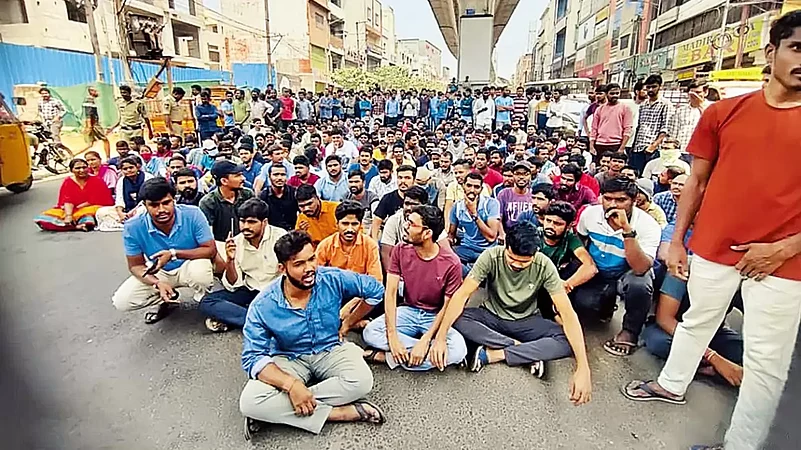In 2010, Sai Kumar Meegada, a 20-year-old chemical engineering student in Hyderabad, hanged himself in his dorm room. Before he signed off from life, Meegada, who routinely scored straight As in his exams, also left a note behind for the people of the yet-to-be-formed state of Telangana.
“For the people of Telangana, this is my final salute,” said his note, which added traction to the decades-old struggle to create a separate state in Andhra Pradesh (AP), one of the larger states in southern India.
Meegada was one of the many people, including youth, who sacrificed their lives on the altar of the Telangana statehood movement, whose champions had argued that the region had been neglected by successive state governments. Almost a decade later, the sacrifices—some of them fatal—made by around 30 lakh youth to give birth to Telangana appear to have been in vain.
‘Jobs, water and financial stability—were the three prime promises made during the statehood movement by the incumbent chief minister of the state, Kalvakuntla Chandrashekar Rao—or KCR—one of the icons of the Telangana movement.
During the movement, more than a thousand students gave up their lives in the hope that the next generation would enjoy improved employment opportunities after the formation of the new state. However, government job aspirants in Hyderabad lament that the current Bharat Rashtra Samithi (formerly TRS), which gained power with the support of the youth, has utterly failed to fulfil these aspirations.
Contrasting claims surround the state’s unemployment rate. In May 2020, the Centre for Monitoring Indian Economy, an independent think-tank reported a record high of 34.8 per cent, the highest in four years. Among election-bound states, Rajasthan (12.5), Telangana (15.1), and Mizoram (11.9) have youth unemployment rates exceeding the national average, as per the 2022-23 Periodic Labour Force Survey.
While contesting job vacancy claims persist, the 2021 Biswal Committee report revealed 1.91 lakh unfilled state government positions since 2015.
The Birth of Telangana
Disputes over the sharing of water resources, especially the Krishna and Godavari rivers, historical and cultural differences, and the demand for equal distribution of resources and opportunities led to Telangana’s separation from AP. The final nail in the coffin was AP’s failure to honour the Gentlemen’s Agreement signed in 1956. A committee, led by Justice Vashishtha Bhargava, revealed a diversion of Rs. 283 million from Telangana to Andhra between 1956 and 1968. The Agreement had aimed to prevent such discrimination. Neglecting Telangana natives’ job losses further fuelled the agitation.
TSPSC Exams and Chaos
When Telangana was eventually formed, it offered aspirations for job seekers. Thousands aimed for stable government positions through Union Public Service Commission (UPSC) or Telangana State Public Service Commission (TSPSC) exams. However, TSPSC-Group 1 exams, vital for roles in departments like State Audit, Public Health and Welfare, Labour, Minority Welfare were last held in 2015. Aspiring candidates, bearing their families’ hopes, anticipate these opportunities for secure employment in the state government.
The TSPSC and the state government face challenges in conducting exams due to paper leaks, delays and biometric oversights. These procedural issues, though administrative in nature, profoundly impact over three lakh job seekers waiting for employment opportunities since 2014.
P. Ashok Kumar, a TSPSC coach facing multiple cases for standing by job aspirants, highlights how the Commission alters exam norms, compelling aspirants to seek legal action instead of concentrating on the exam and job prospects.
“By tweaking norms like adjusting minimum qualification marks for lower castes or neglecting to notify Telugu-medium aspirants for junior college lecturer positions, the government has pushed students to turn to courts or take to the streets. They demand fair exams and appointments after results are announced,” he says.
A group of five government job-aspirants were hanging out at their usual adda, a local café near the ‘Shikara Academy For Competitive Examinations’ in Ashok Nagar, a coaching hub in the city. They shuffle in their seats when asked why they do not choose an alternate career.
“Most of us want to get this job due to benefits like job security and financial stability,” says Mahendar, an aspirant, He adds: “And purely because of our passion to work in the government that we fought for to be created,”—reiterating that it was students who gave up their lives to carve out the state of Telangana, and not politicians.
In April 2022, the recruitment notification for 500 Group 1 posts, including Revenue Divisional Officer and Deputy Superintendent of Police, was issued. The preliminary exam took place in October. Unfortunately, before the Main Exams began, Commission staff allegedly leaked the papers, leading to the exam’s cancellation after the preliminary results were announced.
In June, TSPSC held the exam again but violated norms, including biometric verification. Candidates, citing transparency issues, approached the High Court, resulting in cancellation of the exam.

Suicides over Government Jobs
Walking through the silent halls of the Academy, Sindhuja Reddy, a government job aspirant who is married, apologises for the delay in a hushed tone. She was studying, she says, and therefore did not realise the delay.
The room was divided into rows of neat, squarish compartments, partitioned to avoid ‘distractions’. This is where each government job-aspirant prepares for exams. Each table was covered with colourful Post-It stickers with preparatory notes for upcoming exams. One note said, ‘What does it mean to be an aspirant?’.
“We sit and prepare for exams here as it is quiet and there are like-minded persons,” Sindhuja says.
Silence doesn’t come easy to them. In September, beneath the looming shadows of the coaching institutions along Ashok Nagar, job aspirants like Sindhuja had mourned for Pravallika, a 23-year-old woman job aspirant just like them. She died by suicide in her hostel, frustrated by the TSPSC Group 2 exams’ postponement due to upcoming Assembly elections. Exams which she had diligently prepared
for over two years. Hundreds of aspirants rallied for justice in response to her passing.
“When I heard about Pravallika, I couldn’t move,” Sindhuja recalls. “I did not know her personally. But all of us understood what she was going through. The mental stress one goes through to fight for your own exams to be conducted fairly—which is something that TSPSC should be monitoring—has caused extreme distress to an entire generation,” she says. Most of these job aspirants were around 20 years old when they sat for the Group 1 exams. Many of them are now over the age of 30 and still awaiting a job.
There are many others like Pravallika. Mahendar recalls how one of his friends, also a government job aspirant, told him how she was also on the verge of killing herself. “At least if I die, my family will get the compensation money—the money that I should have been earning by now,” Mahendar’s friend told him over a phone call.
Most of them also hail from rural backgrounds. For those who identify as women, to go back to their villages would mean ending up in forced marriages without a life of their own.
Who is Responsible?
Many job aspirants have been fighting this battle for a fair government recruitment process from the judicial frontlines for seven years now, filing costly high court cases. Their demand? The resignation of the TSPSC chairman, a body overhaul and a CBI probe into the alleged scam.
They allege continuous government interference in the functioning of the constitutional body, including the selection of its committee members, which has caused the recurring irregularities. Two staff members –TSPSC assistant section officer (ASO) P. Praveen Kumar (32) and network administrator A. Raja Sekhar–had stolen the question papers and sold them to several aspirants. The duo was arrested by the police in March this year.
“How did they get access to these question papers when they are ‘confidential’ and are password-protected on the computer of a confidential section officer?” Shaurya, another job aspirant asks.
Not just the desperate job aspirants, the Telangana High Court too had the last laugh in the matter.
As per TSPSC regulations, appointees must be “eminent individuals with backgrounds in academics, management, law, science and technology, social science and humanities and known for their integrity.” Half of them should be former officers from All India Services, Central Services or State Civil Services, according to the Commission’s regulations.
In contrast, currently, a media reporter, a retired deputy tahsildar, a retired primary school teacher and a private ayurveda practitioner are among the members of TSPSC. In June this year, the HC directed the State government to re-examine the appointments and review the eminence and suitability of the Commission’s members.
The BRS Take
The mounting anger appears to be less about electoral promises and more about the government’s handling of the exam. However, the (Bharat Rashtra Samithi) BRS maintains that the KCR government has provided more jobs than promised in the last nine years since the state’s formation.
Kacharla Badri, a BRS member, says that the government has been issuing notifications for job postings. “But they (promises) still need to be fulfilled. The BRS government plans to provide a detailed overview of the number of aspirants and available jobs. Additionally, they aim to release a job calendar every year,” he says.
On multiple occasions, the ruling BRS has claimed the unemployment issue is universal and not just limited to Telangana. “The state government has initiated the process of recruiting for 2.20 lakh jobs. Some have already been inducted. Question paper leaks are unfortunate. No government wants these to happen and sabotage students’ lives. Every measure is being taken to curtail such fiascos,” BRS leader and Hyderabad in-charge Dasoju Sravan said.
Kumar, the TSPSC coach, however, asks an important question linked to the timing of the assurances. Why now? “The BRS seems to have understood that the youth are angry and is now promising an annual job calendar now. What did they do for nine years?”
He says that even if the BRS comes to power, student movements will continue to demand jobs.
Students too say that the damage has already been done.
Many have died, some have given up and gone back to their villages and lakhs are still awaiting employment.
“The government wants to sell the posts to known and preferred persons who would be beneficial to its functioning. At one time, we wanted to be in government. Now we are fighting against the government,” Shaurya says. “There is definitely a scam going on and no one is being held accountable. It’s bigger than the Vyapam (scam),” he alleges.
The Pay Revision Committee (PRC) headed by C R Biswal, constituted in July 2018 pegged the vacancies at 1.91 lakh and mentioned that the Telangana government is working with 61 per cent of its total staff strength in its report in December 2020.
Responding to questions on the performance of BRS on the job front, Professor M Kodandaram, the founder of Telangana Jana Samithi (TJS), notes that the BRS manifesto steers clear of any mention of jobs, apart from minor references in speeches—BRS working president KT Rama Rao said the TSPSC would be revamped if required after the upcoming elections. “Students should remember that securing a job is not in their hands alone. It is dependent on government policies,” he says.
With the state going to polls in less than a month, most students, who spend thousands of rupees on hostel accommodation in addition to fees for enrolment in specific study halls, are seeking a change in power.
“We are thinking of using our vote to dislodge them from power. We end up spending Rs 8,000 to Rs 10,000 per month on our hostel, along with a study hall fee Rs 1,500 to Rs 2,000. This doesn’t include coaching fees,” says Gade Sindhu, a government job aspirant.
Amid the perceived disenchantment among young voters with the BRS, the Congress appears to have emerged as a strong contender and a preferred choice against the ruling party. Sensing an opportunity to attract youth votes, the Congress has promised to release a job calendar, assure two lakh jobs, a monthly unemployment allowance and an inquiry into the alleged TSPSC scam.
“It has been more than a decade since the current government has been in power. The BRS government has failed to control the situation and assure its youth voters of the change that it had promised when the state was born,” Mahendar says.
(This appeared in the print as 'Student Uproar')
Anisha Reddy in Hyderabad






















